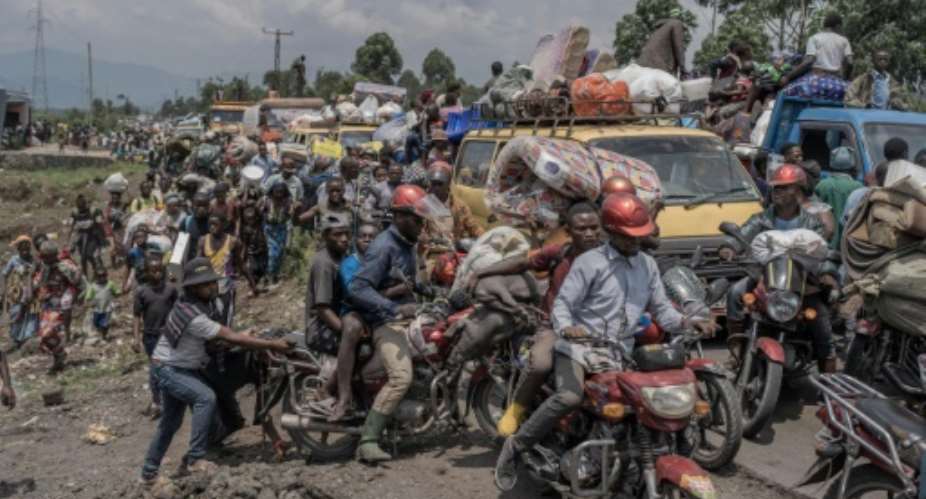Civilians facing bombs, thousands forced to flee and lost children -- aid organisations have sounded the alarm over the impact of escalating violence in eastern Democratic Republic of Congo, where intensifiedfresh fighting erupted on Thursday.
Clashes between M23 rebels and pro-government forces that have gone on for more than two years have intensified in particular in North Kivu province.
In recent weeks "the increase in civilian casualties and the use of heavy weapons in populated areas, including in camps for displaced people, are alarming", International NGO Forum in DRC said in a statement.
The fighting has sparked massive displacement towards several areas, exacerbating the vulnerability of both those forced to flee and the host communities, it warned.
"The situation requires urgent action to protect civilians and ensure humanitarian access," added the Forum, which represents more than 120 international NGOs operating in DRC.
Save the Children said the renewed fighting between the rebels and government troops had displaced at least 150,000 people, more than half of them children, since February 2.
"Parents have reported that many children have been separated in the violence, although the number of lost children is unknown," the charity said in a statement.
Around seven million people have been displaced in DRC, mostly in the east, which has been plagued by violence by armed groups for nearly 30 years, according to the United Nations.
'We are in danger'
After years of dormancy, the M23 (March 23 Movement) took up arms again in late 2021 and has since seized vast swathes of North Kivu.
Kinshasa and UN experts say M23 is supported by neighbouring Rwanda, a claim Kigali denies.
Fighting resumed around Goma, the capital of North Kivu province, after a lull during the December 20 election which returned President Felix Tshisekedi to power for a second term.
Doctors without Borders said the medical units it supported in North Kivu had seen a large influx of war wounded in recent days.
At the same time thousands were fleeing the latest armed clashes, it said.
On Wednesday, thousands of people arrived in Goma, fleeing violence in the town of Sake, about 20 kilometres (12 miles) away and strategically located on a major highway.
Six people were reported killed on Wednesday in Sake and many more injured, medical and security sources said.
Jacinthe Maarifa, from the Agir-RDC NGO, said they'd seen vulnerable people, including children, pregnant women and the elderly, arriving with nothing.
"They are piled up in schools and churches. The needs are huge," he told AFP, appealing for aid.
Army spokesman General Sylvain Ekenge told reporters late Tuesday there had been "intense fighting" for control of a stretch of highway running between Sake and Minova, a small town in the neighbouring province of South Kivu.
Residents contacted by telephone said fighting was still going on in the region of Sake on Thursday.
Other clashes were reported north of Goma in Nyiragongo territory, pitting M23 rebels mostly against armed militias known locally as wazalendo, and cutting off north-bound road traffic.
"We woke up to the sound of heavy arms fire and we are keeping burrowed down in our houses," said one resident of Rwibiranga, a village north of Goma, who asked not to be named.
"The situation is still unclear and we are in danger."
A driver of a moto-taxi who was taking a customer towards Rutshuru said he'd been forced to turn around.
"The soldiers banned us from passing, saying fighting is ongoing," he said.
UN Under-Secretary-General for peacekeeping operations, Jean-Pierre Lacroix, on his return from a visit to the east of DRC, voiced concern Wednesday at the risk of a "regional explosion".
He called for an urgent resumption of "diplomatic efforts" to resolve the conflict.
France also called for "the relaunch of regional diplomatic processes, notably for a new ceasefire to come into force", foreign ministry spokesman Christophe Lemoine said in Paris.





 Kenya Airways says to resume flights to Kinshasa after staff freed
Kenya Airways says to resume flights to Kinshasa after staff freed
 Junta-led Chad counts votes in first for coup-hit region
Junta-led Chad counts votes in first for coup-hit region
 President Akufo-Addo appoints Joyce Adjoa Agyeiwaa as Birim Central MCE
President Akufo-Addo appoints Joyce Adjoa Agyeiwaa as Birim Central MCE
 Cedi depreciation has been lower under NPP administration – Bawumia
Cedi depreciation has been lower under NPP administration – Bawumia
 Akufo-Addo has been vindicated in selecting me as his Vice President – Dr. Bawum...
Akufo-Addo has been vindicated in selecting me as his Vice President – Dr. Bawum...
 AstroTurf Project Sabotage: Asunafo North MP accuses NDC PC Haruna Mohammed
AstroTurf Project Sabotage: Asunafo North MP accuses NDC PC Haruna Mohammed
 Election 2024: I’m ready to serve Ghana with my heart, energies – Bawumia
Election 2024: I’m ready to serve Ghana with my heart, energies – Bawumia
 We saved Ghana $19million in 2020 elections – EC
We saved Ghana $19million in 2020 elections – EC
 Nobody has ever enticed me with money to rule in his or her favour — Otumfuo
Nobody has ever enticed me with money to rule in his or her favour — Otumfuo
 Court convicts student for issuing GHC50,000 dud cheque
Court convicts student for issuing GHC50,000 dud cheque
